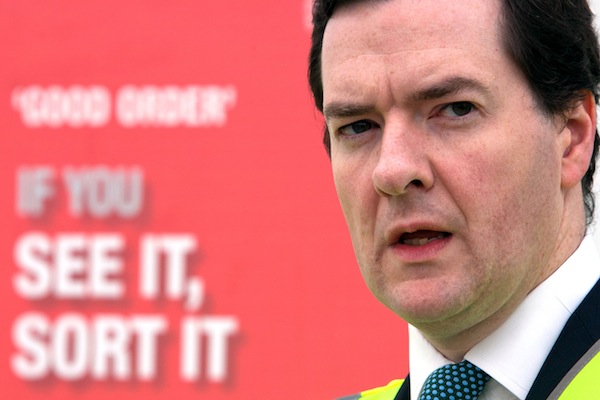Today’s public finance statistics are another case of good news/bad news for the government. First, the good news: the ONS revised down its estimate for government borrowing in the last fiscal year (2011/12) from £125 billion to £119.3 billion. That’s £6.7 billion below the OBR’s estimate in March this year, and means that the coalition succeeded in cutting the deficit by 25 per cent in its first two years (29 per cent in real terms).
But the bad news comes when you look at the current fiscal year. The ONS estimates government borrowing for August at £14.41 billion — roughly the same as August 2011 (£14.37 billion). These estimates do tend to end up being revised heavily — by an average of £1.8 billion, and usually downwards — so that figure might improve in the next releases.
But for now it takes total borrowing since April to £31 billion — compared to £48.4 billion in the equivalent five months last year. But that sounds a lot better than it really is, because it includes the effect of the Royal Mail pension transfer, which reduces borrowing this year by £28 billion. So really, the government ran a deficit of £59 billion from April to August 2012, £10.6 billion more than the same months in 2011.
In March, the OBR predicted that the deficit would be £92 billion this year — or £120 billion excluding the Royal Mail pension effect. As it turns out, that’d actually be a slight increase on last year’s £119.3 billion deficit. But it now looks like the government isn’t even going to manage that. In fact, Citi Research predicts it’ll overshoot by roughly £10 billion.
And why has it gone off track? The problem is the lack of economic recovery. Tax receipts were forecast to rise by 3.3 per cent this year, but so far are up by just 0.4 per cent (and actually down 2.3 per cent in real terms). Labour blames spending cuts, naturally, but it’s worth noting that central government current spending is up 3 per cent on last year (0.3 per cent in real terms) — although that’s thanks to the rising benefit bill. Even stripping out benefits and debt interest, core spending is up by 2.4 per cent — in real terms, down just 0.3 per cent.
All of this makes it even more likely that — come the autumn statement on 5 December — the OBR will show Osborne missing his debt target (to have the debt/GDP ratio falling in 2015/16). Mervyn King prepared the ground for this on Channel 4 last night, saying it would be ‘acceptable’ to miss the target if the world economy doesn’t recover.






Comments